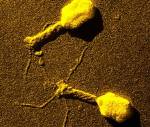What are Bacteria? What are Viruses?
What are Bacteria?
 Bacteria are microscopic organisms commonly called microbes. They are one-celled living organisms that have various shapes, such as rod-shaped bacillus, spiral shaped spirochete and spherical coccu. Bacteria are everywhere, in water, soil and even inside other living organisms. However, there are bacteria that are not harmful to human beings, and some types are essential for the growth and production of food. Disease-bearing bacteria produce poison called toxins against some of which medical science has developed antitoxins. Most ailments caused by bacteria nowadays no longer pose a big problem to doctors around the world.
Bacteria are microscopic organisms commonly called microbes. They are one-celled living organisms that have various shapes, such as rod-shaped bacillus, spiral shaped spirochete and spherical coccu. Bacteria are everywhere, in water, soil and even inside other living organisms. However, there are bacteria that are not harmful to human beings, and some types are essential for the growth and production of food. Disease-bearing bacteria produce poison called toxins against some of which medical science has developed antitoxins. Most ailments caused by bacteria nowadays no longer pose a big problem to doctors around the world.
Note: PYRO-ENERGEN cannot cure bacterial diseases. Consult your doctor.
What are Viruses?
 According to the medical encyclopedia, virus is any wide variety of exceedingly small particles that causes different diseases. They are called filterable viruses because unlike bacteria, they pass through ordinary laboratory filters. Viruses occupy the borderline between living and nonliving things. Many medical scientists believe that they are complex molecules of protein and nucleic acid, resembling genes. They show no lifelike activity, unless they are introduced into living cell. They cannot be grown in the laboratory on simple nutrient substances as bacteria can. Once inside a cell, they undergo a process of making copies of itself or reproducing. By changing the cell's chemistry the virus causes the cell to produce toxins. Specific viruses are responsible for a host of diseases.
According to the medical encyclopedia, virus is any wide variety of exceedingly small particles that causes different diseases. They are called filterable viruses because unlike bacteria, they pass through ordinary laboratory filters. Viruses occupy the borderline between living and nonliving things. Many medical scientists believe that they are complex molecules of protein and nucleic acid, resembling genes. They show no lifelike activity, unless they are introduced into living cell. They cannot be grown in the laboratory on simple nutrient substances as bacteria can. Once inside a cell, they undergo a process of making copies of itself or reproducing. By changing the cell's chemistry the virus causes the cell to produce toxins. Specific viruses are responsible for a host of diseases.
Today, we have an understanding of what a virus is, yet viral diseases such as cancer, HIV/AIDS, and Ebola remain incurable. Why is that? It is because no one knows how virus was born.
Vaccination
 Scientists and doctors are working to find definitive cures for viral diseases, and vaccination is one of the most remarkable remedies or preventive measures. However, new viruses continue to emerge and affect healthy individuals every day. Developing and researching new vaccines takes time, and it becomes challenging to keep up with new strains of diseases.
Scientists and doctors are working to find definitive cures for viral diseases, and vaccination is one of the most remarkable remedies or preventive measures. However, new viruses continue to emerge and affect healthy individuals every day. Developing and researching new vaccines takes time, and it becomes challenging to keep up with new strains of diseases.
There is a passage that goes, "Go up into Gilead, and take balm, O virgin, the daughter of Egypt: in vain shalt thou use many medicines; for thou shalt not be cured." (Jeremiah 46:11)
Is it not because no one in medical science has found the true origin of such diseases, and do you not realize that these incurable diseases affect only human beings? If a universal vaccine could be found, there would be no more suffering from incurable diseases. Now is the time to understand that viruses have originated from something. As mentioned on this website, viruses are a byproduct of an external negative energy force similar to the ionospheric wave in the sky.
The PYRO-ENERGEN does not kill the virus itself. It functions like a vaccine by preventing the virus from multiplying. In the case of the PYRO-ENERGEN, it prevents or repels the negative energy that creates viruses in the body.
To learn more about the Negative Energy, visit the page "Root Cause of Cancer and Viral Diseases Revealed".
Which do you prefer, "kill the virus from the body" or "immunize the body from viruses"?




